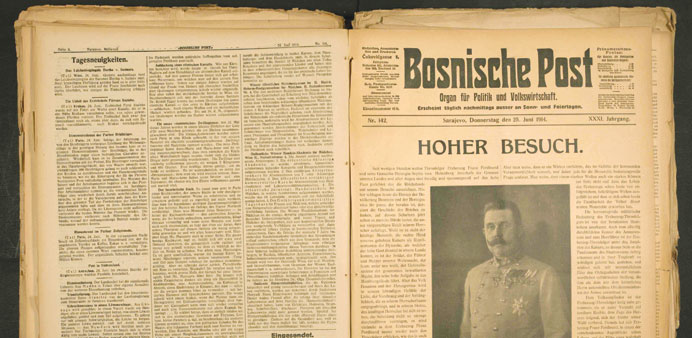By Daria Sito-Sucic, Reuters/Sarajevo
A group of Balkan experts have launched a high-tech project to digitise Bosnia’s historical archives that were partly destroyed during its three wars last century and are still under threat from neglect and a lack of funding.
The project promises to make available online a host of records and papers detailing Bosnia’s turbulent past, most notably the events and atmosphere surrounding the 1914 Sarajevo assassination that triggered World War I.
Bosnia has been in a state of the political paralysis since its 1992-95 war, which ended in a US-brokered peace deal that silenced the guns but sowed the seeds for two decades of dysfunctional government.
Political bickering between the former warring sides has left many cultural and historical institutions without funding.
“Bosnia’s national heritage had been systematically destroyed during the three wars and because of a lack of interest and neglect by political parties,” James Lyon, a US historian and former Balkan analyst for the International Crisis Group thinktank, told a news conference.
Lyon and other Balkan experts created the Foundation for the Preservation of Historical Heritage in January, initially to help digitise the parts of Bosnia’s National Library archives relating to the June 1914 killing of the heir to the Habsburg throne, Archduke Franz Ferdinand.
The experts have now expanded the project after part of the national archive, housed in the state presidency in Sarajevo, was set ablaze in anti-government rioting in February, and floodwaters threatened a number of municipal and private archives in May.
Many of the National Library’s records and manuscripts were destroyed in the Bosnian Serb siege of Sarajevo during the 1992-95 war, which razed the landmark Town Hall that housed the library.
The National Library, the National Museum and five other museums have been without official status or regular funding since the war because of clashing views of Bosnia’s past among its Orthodox Serbs, Catholic Croats and Muslim Bosniaks.
In some cases, priceless national treasures have been left to decay in inadequate storage facilities without temperature controls or ventilation.
The foundation is using equipment borrowed from FamilySearch, a genealogy organisation run by the Utah-based Church of Jesus Christ of Latter-day Saints, also known as the Mormon church, and has begun helping to digitise the archives of the National Library, the Historical Museum and Sarajevo’s oldest newspaper, Oslobodjenje.
“In a situation in which the museum, due to its unresolved legal status, has not been able to adequately secure Bosnia’s cultural and historic heritage, the foundation’s support is of immense importance to us,” said Elma Hasimbegovic, director of the Historical Museum.
Lyon has already been involved in the digitisation of other archives in Bosnia, including illuminated 14th century gospels written on leather, decrees of Ottoman sultans and records from the Hapsburg era and the Kingdom of Yugoslavia.
“The documents from that period will become accessible online for everyone interested,” said Chris Bennett, the Foundation’s Executive Director. He said the Foundation was considering launching similar projects across the region.

A digitised image of the front page of the June 25, 1914, edition of the Bosnische Post before the visit to Sarajevo by the heir to the Habsburg thron
